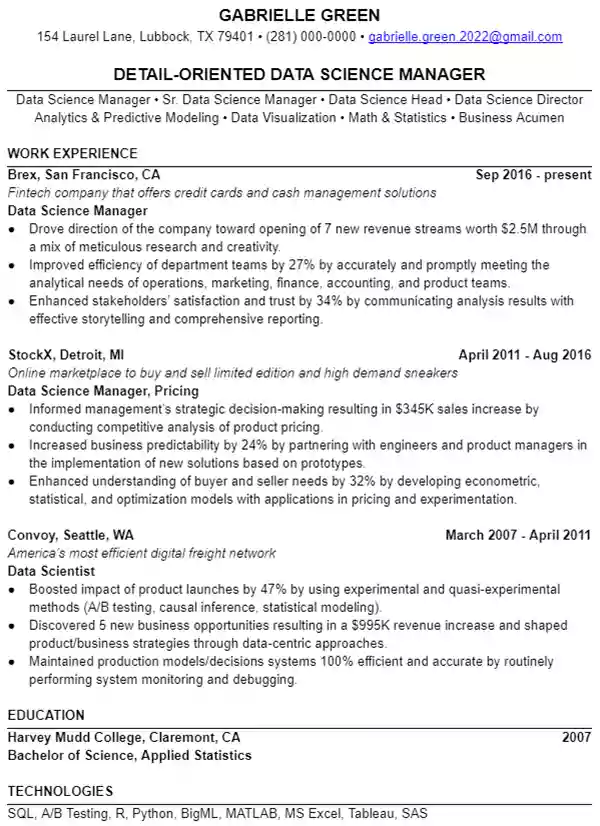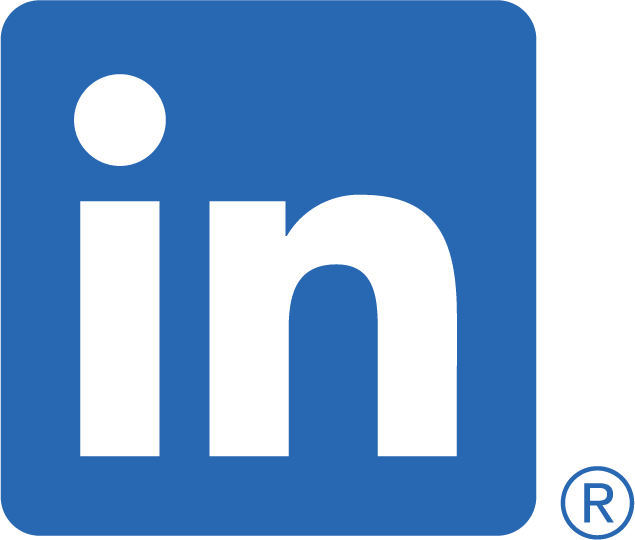Data Science Resume Example
Writing a great Data Science resume does not need to be hard. All you need to do is follow our easy resume writing guide to write your own resume that will get you more job interviews fast. Or, have us write your resume for free.


How to write a great Data Science resume
Data Science is one of the fastest-growing and most critical job fields in the country. Companies need data-fluent professionals to not only analyze their data, but make projections, trends, and predictions based on that data. They need the critical data science link from IT to the business division.
Though it may seem like it’s a “buyer’s market,” in that demand from employers is high, you still need to have a high-quality resume to position yourself to get the best job for your experience and your needs as a data science professional.
We’ve created a data science resume template that you can take a look at right here.
Interested in learning why this data science resume is so effective?
I want to tell you. I’m ready to share with you the secret for writing a great resume that gets you more interviews and gets you hired faster.
Let’s dive in.
Why is my Data Science resume so important?
Here’s the painful truth. For every job posting on a job board like LinkedIn or Monster, over 117 people will apply.
That’s 117 resumes for a recruiter to sort through.
Here’s the crazy thing. Many of those people aren’t even qualified. Many others who are qualified haven’t formatted their resume correctly, so recruiters don’t realize how qualified they are.
You need to have a great resume that shows, yes, I am qualified for this position. Interview me!
With the future of your career riding on your data science resume, you may want to consider having a professional write your resume for you.
At Leet Resumes, we’re prepared to do that.
We’re ready to write your resume for free – tips appreciated!
How do I format my Data Science resume?
If you’re not ready to hire us to write your resume, but you are curious as to how to improve your data science resume, then you’ve come to the right place.
We’re ready to pass along our secret, winning format for writing an amazing data science resume that gets you more interviews fast.
But, before I dive into that, I want to share with you what you should not do.
Do not use any funny formatting. This means no text boxes, no images, no extra columns.
You’re not designing a piece of art, you’re creating a functional document that will get you hired.
All that extra formatting is not functional. When you submit your resume to a job, it is going to be uploaded to an ATS (applicant tracking software) that automatically chops up your resume into different categories (name, employer, skills), and then assigns you a rating based on how well it thinks you are aligned for that job.
When you add all this funny formatting, you confuse the ATS, and it ends up giving you a bad rating.
A Bad rating means no interview.
You want an interview, so you need to keep your formatting clean.
Then, you’ll want to structure your resume like this:
- Name + Contact
- Professional Headline
- Professional Summary
- Work Experience
- Education
- Keywords
Name + Contact
Don’t overthink this one. It’s not a trick question.
All you need to do is put your name at the top, then put your contact information right below it.
What is your contact info? It’s your phone number and your email address – that’s it.
You can include your LinkedIn profile, but it’s not mission-critical. For resumes, we believe that focusing only on the critical elements will make your final document stronger and easier to read.
Professional Headline
This is your introduction to the recruiter. This is where you tell the recruiter what you do.
You’ll need to use no more than five words to get across your job title, your seniority, and your work style.
Here’s a pretty easy example: Meticulous Data Science Professional.
In four words, you’ve already conveyed your career and work style. You’re setting the recruiter up to keep reading.
Professional Summary
The professional summary is the part of your resume where you reel in the recruiter by giving them a high-level summary of your career in data science.
You’ll use 2-4 lines organized like so:
- Job titles you’re seeking
- Data Science skills you possess
- Achievements you’ve accomplished in data science
- Relevant promotions and awards
As a Data Science professional, you’ll need to include lines 1 and 2 for certain. Lines three and four are dependent upon your experience. If you’ve been working in your field for quite some time, you should have no problem filling out these two lines.
How are you holding up? Do you have questions about what we’ve gone over?
Why not hire us to write your resume for you. We’ll write it for free – tips appreciated.
Work Experience
This needs to be the focus of your data science resume. Here, you’ll spell out the specific experiences you’ve had at each job to convince your recruiter that they need to set up an interview with you.
You’ll win over a recruiter by following these five tenets when it comes to your work experience:
Focus on successes, achievements, and accomplishments
This is our favorite method to grab and hold a recruiter’s attention. Instead of rattling off your daily job duties, you focus on your big wins to show off how much of an impact you’ve had at your job.
This, in turn, will get the recruiter excited about what big wins you’ll perform at their company once they hire you.
Start with a strong verb
Quantified, Analyzed, Prepared, Produced, Led, Implemented. These strong verbs should lead your bullet points to put the recruiter right into the action of your work experience.
This helps you maximize the space on your resume, using every word to drive home the point that you are qualified to do the job.
Quantify your experience
Want to boost your chances of getting an interview? Quantify your experience – i.e. put numbers everywhere you can.
Instead of saying you prepared a report, say how many reports you prepared – how much data you analyzed, how much money you saved your company. This will help a recruiter or hiring manager grasp the impact you’ve had at an organization, which will boost your chances of getting that job interview.
Include your promotions
If you’ve been working in data science for a while, you may have gotten a promotion or two. If so, you’ll want to include those.
Why?
Because putting your promotions on your resumes signifies that you are able to learn and grow on the job. This will catch a recruiter’s eye, and they’ll be more likely to call you up for an interview.
Don’t forget dates
Lastly, don’t forget to include dates for every job experience. It may be tempting to remove dates, especially if you’ve had some employment gaps, but this often leads to more confusion and questions for the recruiter.
You want to be upfront and honest to increase your chances of getting an interview, so it pays to include the dates.
Education
Once you’ve finished the bulk of your resume, it’s on to your education section. This comparatively small section is where you put any degrees or certificates you have earned, along with the institution that conferred them.
Do not put any degrees you haven’t completed, unless you are expected to graduate within the next several months. In that case, you should put “anticipated graduation” along with the date.
Keywords
This is the last section of your data science resume. It is the last chance for you to win over your recruiter or hiring manager that is reading your resume.
You should know that when a recruiter reads your resume, they often have a checklist of skills that you need to have before they will interview you. This keywords section is where you will list those skills so that you can clinch that interview.
What are keywords? They’re hard skills, soft skills, and awards that are relevant to your career in data science.
This isn’t an exhaustive list, but here are some key skills that you may want to include:
- Machine Learning
- Data Visualization
- Data Wrangling
- Programming
- Statistics and Statistical Analysis
- AI
- Communication Skills
- Teamwork
- Leadership
- Computer Languages
- Programming
Once you’ve listed all of your relevant keywords, you’re done! That’s it! Congrats, you’ve finished your data science resume.
Now all you need to do is start applying for those jobs!
Can I get someone to write my Data Science resume for me?
Overwhelmed by all this data science resume advice? Do you need someone to help you out? Try Leet Resumes. We will write you a personalized Data Science resume for free (tips are appreciated).
You have nothing to lose and a whole career to gain.










